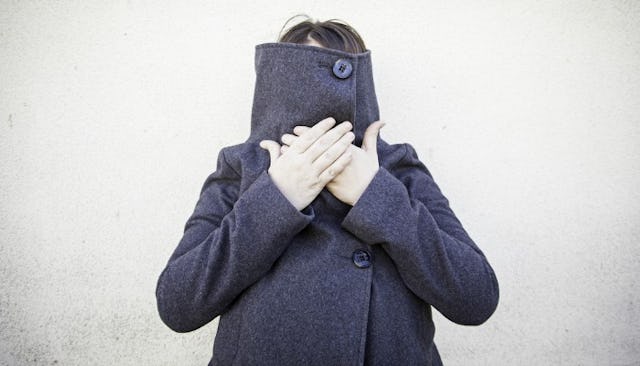How Postpartum Anxiety Stole My Joy

In the final month of my first pregnancy, my partner and I spent four long, torturous evenings enduring birthing classes. Postpartum depression (PPD) was the topic during the final session, when we focused on caring for Baby and Mama during those first tender weeks after birth. I vividly remember the instructor noting that PPD was more prevalent in women with previous histories of mood disorders. Ding ding ding! I nudged my husband. “That’s me,” I whispered. “Previous mood disorder.” I’d been diagnosed with generalized anxiety disorder a few years prior, though behavioral therapy had brought it well under control. My husband nodded and diligently studied the symptoms outlined on his handout. Clearly, with our powers combined, we’d nip any PPD in the bud.
It was one of our many pre-parent notions that went out the window when my daughter exited my womb and arrived in our world.
The first weeks were a blur of breastfeeding struggles, hormonal riptides, and post-surgical pain, but not depression. I actually laughed about my frequent crying jags, joking that they were just my pregnancy hormones exiting via my eyes, because I certainly didn’t feel sad.
Here’s what I felt instead:
1. Terror
Sometimes I could articulate my fears, like I couldn’t sleep with the lights off because I needed to see the baby at all times. More often, though, it was just general dread and panic, especially at night.
2. Catastrophizing
I’ve long excelled at jumping to the worst conclusion, but postpartum anxiety took me to a new level. Breastfeeding issues meant long-term sensorimotor dysfunction. Sleepiness meant pathological lethargy. Crying for a few minutes at bedtime meant we were in for a lifetime of sleep problems.
3. Rage
I’ve never been an angry person, but oh, I was perpetually seething and unpredictably screaming, and always at my husband.
4. Regret
A few weeks postpartum, I saw two college students behind me in line at Kroger with their arms full of snacks and DVDs. I fled, bawling. What their girls’ night represented to me was everything I thought I’d never have again: friendship, freedom, relaxation. Clearly, I’d made the worst and most irrevocable mistake ever. I was never suicidal, but I fantasized about leaving. Moreover, I was convinced that my husband and child would be better off without me.
5. Detachment
A friend inhaled my newborn’s scent and murmured, “Isn’t it just amazing how you’d step in front of a bus for her?” I smiled wanly, thinking, “I wonder if I’ll ever feel that way.” I kept using the wrong pronouns for my daughter, repeatedly calling her him and he. She didn’t even look the way I expected: I’d envisioned a bald, pale, brown-eyed baby. She came out with a shock of dark hair, olive skin, navy eyes and unrecognizable features. Everyone swore she was my clone. I searched her face for signs of me and came up empty.
6. Intrusive thoughts
The classic new-mom vision of falling down the stairs with your newborn in your arms? Yep, I had that, plus a million other horrific images, constantly.
7. Insomnia and Sleep Disturbances
Anyone with a newborn is sleep-deprived; it’s par for the course. But when given the chance to sleep, I found it nearly impossible. I couldn’t fall asleep, couldn’t stay asleep, and if sleep happened to grace me, I’d have nightmares and hallucinations (both visual, like men standing next to my bed, and auditory, like loud booms just as I drifted off).
8. Compulsions
The only way I felt in control was to attach meaning to insignificant things, especially when it came to helping her sleep. Her position in her crib, the order of bedtime songs, how her clothes hung in the closet: I truly believed that whether or not she slept was dependent on each of these factors.
So, no, I wasn’t depressed. I was terrified, enraged, obsessive, panicked and regretful. And since I had no catchall term for my abominable feelings, I named them motherhood and spent untold hours wondering how I’d gotten myself into such an immutable mess.
Versions of these symptoms are typical and expected in postpartum women. In fact, I dismissed my symptoms in part because when I’d confess one of them, another mom would pipe up with her similar experience. But for me, the symptoms were extreme, persistent and unrelenting.
The healing began after a lactation appointment. A pediatrician who’d talked with us that morning contacted me afterwards, “just to check in,” and floated the possibility of postpartum anxiety. That made total and immediate sense to me, which brought overwhelming relief.
This wasn’t motherhood. This was anxiety.
Within a week, I had appointments with a social worker and a psychiatrist. The anxiety eased gradually, with big shifts happening when we sleep-trained, when my job situation changed, and when I weaned. Thankfully, two years into motherhood, my symptoms are gone. But my experience with a postpartum mood disorder makes it difficult and frightening to consider having another baby.
My hope is that awareness and a willingness to tap the resources I now know exist will get me through another baby, which is what I also hope for anyone reading this. If motherhood feels terrible to you so far, know this: You’re not alone, and it doesn’t have to feel this way. My daughter is now my unparalleled joy, which is something postpartum anxiety wouldn’t allow me to even dream of.
I’m so glad the anxiety was lying.